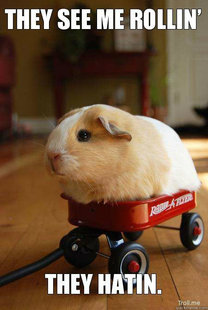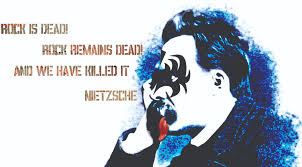written by the Judge
Guidelines to writing a great article. 1.) Research
thoroughly. 2.) Redraft substantially and ask for editing advice before
publishing it. 3.) Don’t leave writing the article to the night before it has
to be posted. 4.) Don’t drink while writing (duh). 5.) If you really have to
drink, then at least don’t drink Budweiser. 6.) Don’t swear in the article.
7.) Don’t let your personal bias enter the discussion. Having
said that, let’s talk about rock and roll.
The only reason I’m writing about this topic is that I
recently noticed the connection (or the particular rift) between rock and
poetry. It all goes back to this truth universally acknowledged that rock is
dead (or dying, or whatever). I mean, of course it’s been dying since 1959, but
now it seems like it might be dying in a more prosaic sense – the rivers of
money are drying up. There’s no more of it in the business. Buying music is
passé. Heck, it’s an insult: you’re so white that you buy rap music.
 |
| This helps when you're writing |
In fact, just about the only time the orbit of my life
intersects with that of Planet Rock is when someone on Facebook links me to an
article on the topic – and they are all the same. It’s always someone taking up
a tone that Aeschylus wouldn’t have the nerve to include in his plays, informing
us that there is no money (or no popularity, grit, enthusiasm, etc. – because
there is no money) in rock and roll anymore. I mean, not only don't people buy
albums anymore – not only aren't the stars shovelling in the millions – but aspiring
rockers can barely cover the expenses for gas money after the tours, and the
Monday after the show they have to go back to work! You know, just like normal people! What kind of a rock star
is that??
I’d probably be a bit more sensitive if I weren’t imbibing
this goddamn Budweiser right now, but reading these kind of complaints, from
the point of view of someone who works (ha ha) in the subculture of poetry, my
reaction always goes kind of like this guy with the pink background:
(And I’m going to spare myself a full paragraph of
self-indulgent examples here by assuming that, if you’re reading this article,
you know exactly how much money even the most successful poets can hope to
make, and what it means to reconcile that passion with your needs).
So to put this delicately – the doom & gloom from the
music industry comes across to me as potentially legitimate and correct, yes,
but at the same time completely hilarious. Not because I don’t believe that
their (financial) bubble is actually imploding, but because from the position
where I work – and where all my friends work – postulating an equation in which
the quality of creative work has something to do with your ability to make a
living out of it is a JOKE.
It led me to momentarily fantasise what things would be like
if poets and rock stars could swap positions – not an unfamiliar exercise,
because I suppose that (almost) anyone who ever dreamt of being a poet started
out by visualising a guy / gal who has something (not everything, but
something) in common with the roaming guitarist. There’s a reason Rimbaud as the
original rock star (or prototype punk – he’s a flexible figure) never gets old.
Aside from the brilliant poetry, I mean.
So maybe if rock really keeps dying the way that it
purportedly is, it’s going to become smarter and more subtle. It could even
make people like me interested.
 |
| Probably more representative of youth music now |
This, however, is the point where the parallel collapses (in
part because the Bud is really beginning to go to my head, and I’ve got to
start wrapping up the arguments while they still look like arguments). There
are many good reasons why rock and poetry will never trade positions. One, just
off the top of my head, is that poetry is more ‘pure’ as an art. Rock and roll
presupposes an involvement with (if not a commitment to) a certain lifestyle.
Lester Bangs didn’t just write about the stuff, he lived it. He did the drugs.
He got laid. He buried the bodies. Poetry isn’t cool like that. So many of our
best poets are people with utterly boring CVs who conjure incredible worlds
only out of their imaginations. There is no cultural script that you have to
follow in order to ‘qualify’ as a poet.
Another reason is that poetry is, I think, much better
positioned to confront the techno-cultural challenges of a changing world. Rock
and roll isn’t losing out to fashion or taste – it’s being killed by
globalisation and the internet. Besides, the poetry subculture has the
advantage that its representatives DO NOT GIVE A FLYING FUCK about money. If
there is, or has ever been, an artistic vocation that cares *less* than poets do
about la plata, then I’ve never heard
of it. So if anyone told a poet that someone had downloaded his / her book and
distributed five-thousand copies of it totally for free, the reaction would be
one of unadulterated joy. You got me five-thousand readers, for free?! Heck,
we’d probably be encouraging piracy,
if it could get more of our stuff out there.
Rock and roll – well, I don’t know if it’s really dead /
dying. To be honest I don’t care that much, as I never really listened to it a
great deal. I used to have a thing for Metallica and a couple of their
offspring when I was sixteen, but I listen to them now and it’s amazing just
how crushingly boring all of their songs have become to me. In terms of my
personal interest, rock and roll hits an unfortunate middle point – it’s neither as
easy as pop and electronica, nor as sophisticated as jazz and classical,
meaning that the rewards of investing in it are going to be limited either
way.

But even though I don’t know if it is dying, one thing I
feel I can say with a certain confidence is that rock is old. I’ll be more
precise – rock is no longer a cultural signifier that is associated with youth,
and this has nothing to do with the fact that 90% of the major news stories about
rockers out there concern some old fart who is releasing his 20th
album or who died (I mean, even friggin’ Jack Black in School of Rock was thirty-four years old. That’s well past the age
of college shenanigans, man). Even in the nineties, when I was less than ten
years old and still reading trashy stuff like, y’know, Conan Doyle and
Melville, there was this cultural dichotomy about classical music being for old
people and rock ‘n’ roll being for the new generations. It wasn’t because of
the relative ages of those who actually listened to it – no, it was the
meta-narrative that supported rock and roll from its inception onwards. Now it
is that same meta-narrative that has vanished from popular culture (despite
still being trumpeted within the corrals of the rock subculture). When you see
clichés and stereotypes representing contemporary teens, they’re seldom
listening to / talking about rock music. The drugs are still there, of course,
and so is the sex (as if…). But the closest thing to a product for young
rockers that I recall is something as embarrassing as Freaky Friday, assuming that fantasy can be called rock at all, and
that’s a remake of a 1976 film. The rest borders on parody: Guitar Hero is its own popular myth now,
and the title itself is tongue-in-cheek.
Poetry doesn’t have an age. It’s always been the stuff that
our forebears did, which may be why poetry books only really start selling
something once the poet is dead. And that’s why poetry itself can never die.
And hey, maybe rock isn’t dead at all. Maybe it’s just
evolved (or in-volved) from a mass phenomenon into a subculture. If that’s the
case, then welcome to the club. I’ll buy you a drink with the sum profits of my
first four books (whenever I publish them).















